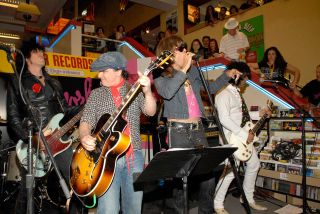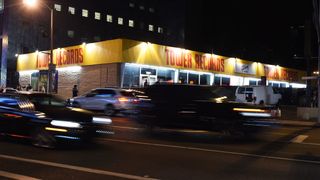In 1999, Tower Records had sales of over one billion dollars. Seven years later, the US chain was bankrupt. Now, a new documentary examines Tower’s rise, reign, crash and burn – with a little help from Grohl and Springsteen – and asks whether modern music consumption has lost its mojo…
There is no shortage of nostalgia for thumbing vinyl in the nicotine fug of a cramped indie record shop. But just as magical, at the other extreme, was to emerge from Piccadilly Circus tube in the late-’80s, spot the red-and-gold logo of Tower Records, and blow an afternoon in that 25,000 square-foot temple of music. More than HMV, more than Our Price, Tower was the corporate giant it was OK to like – at least until 2006, when the US firm filed for bankruptcy.
Colin Hanks evidently feels the same way. The 38-year-old actor and filmmaker grew up in Sacramento, California, and remembers it as a point of pride that Tower had roots in his hometown, with Russ Solomon opening his first store on Watt Avenue in 1960. Decades later, Hanks’ new documentary – All Things Must Pass – is a character-driven love-letter to the chain that sold his formative records, laced with regret at our changing music consumption. “I don’t think we’ll ever see anything like Tower Records again,” he says.
As a teenager, you shopped at the original store on Watt Avenue, right?
“Yeah, it was one of my haunts. It was the best store. It had the most music. One thing I loved about Tower, it wasn’t this store that just sold the Top 40. And they didn’t care if you bought anything. So if you were a teenager with five hours to kill, you’d get into a conversation with the clerks and spend the whole afternoon there. I wanted to remind people that it wasn’t just a store. It was a social thing. It was like a bar. It was just selling music instead of beer.”
You can’t say that about the iTunes Store…
“You have all these streaming services now and you’ll never hear the words, ‘That’s out of print’. And that’s great. But what you’re missing is the personal connection. Also, I don’t remember where I was when I downloaded the new Iggy Pop record. But I do remember when I bought records that changed my life. When you actually brought a record up to the counter, listened to it in your car and gave it the thumbs-up or down: that leaves a big imprint. I remember buying BloodSugarSexMagik and Nirvana’s Nevermind at Tower Records, Beastie Boys and Public Enemy tapes before that.”

The film shows that the people behind Tower were characters, not just corporate suits…
“Oh, they were on the front line, man. They were soldiers of rock, for sure. Towards the end, Tower was a big company, obviously: they had 200 stores around the world. But they all operated under that same sorta mom-and-pop mentality with which it started. I mean, here you have a retail operation that has no dress code. More importantly, you don’t have to force people to buy stuff. They can just hang out. That’s pretty revolutionary. There was nothing corporate about those stores and the way they were run.”
People had sex in the listening booths on Watt Avenue, didn’t they?
“Well, it’s all rock‘n’roll, man!”
Why choose Dave Grohl, Bruce Springsteen and Elton John as contributors?
“I noticed there’s a trend in documentaries where you have all your famous people in the first four minutes telling you why the movie is important. Then you never see them again. I wanted to avoid that. So we were methodical in who we spoke to, made sure they had some personal connection that would push our narrative. We knew that Grohl was an employee. Elton John, there was that famous quote where he said if he could do it all over again, the job he’d love most would be to work for Tower. And any time you can get Bruce Springsteen to talk about anything, you want to listen, y’know?”
What were the challenges of getting this film made?
“What, aside from money? We started going around with the idea two years after Tower closed. All of western civilisation was seemingly going bankrupt at the time. You had core companies like Lehman Brothers facing bankruptcy, so there was a mentality as we were raising funds where people said, ‘Look, no-one’s gonna care about a company that went bankrupt two years ago when all these much more quote-unquote important companies are bankrupt’. I disagreed. We were able to persevere, to keep making the movie in little chunks. Crowdfunding kept it alive. Eventually, it reached a point where all of a sudden people realised how special Tower was, that they’d missed it.”
Some people would argue that Tower killed lots of independents?
“Well, I think, to a degree, that’s probably valid. But the thing I would say is, every store was run by the people working there at the ground level. So there was a tremendous amount of pride. You had these stores that were, in a way, very much community-run. Each had their own art department, each one was designed differently. The only thing that matched was the sign outside. So that is true. But keep in mind: it’s not like Tower was the only one that was doing it. You had HMV. You had Sam Goody. They all did it.”
Do you think we’ve seen the last of super-retailers like Tower?
“Well, super-retailers in terms of 200 stores around the world – absolutely. I think you’d be hard-pressed to find a company able to maintain that presence selling one specific thing. You might have a chain of six or seven stores. But nothing like Tower was. I don’t think we’ll ever see anything like that again.”
Is it an oversimplification to say the Internet is killing record shops?
“Oh, absolutely. That was definitely one of the myths I wanted to dispel. Napster was not what killed Tower Records. It was a part of it. But the events that brought Tower down were self-inflicted and circumstance, more than anything. They expanded into countries which had weak economies, and made poor real-estate decisions, combined with an industry that was propped up on CDs. Napster played a part in it, for sure. But it’s not the sole reason.”
All Things Must Pass is out on DVD May 6 and Digital May 9.


